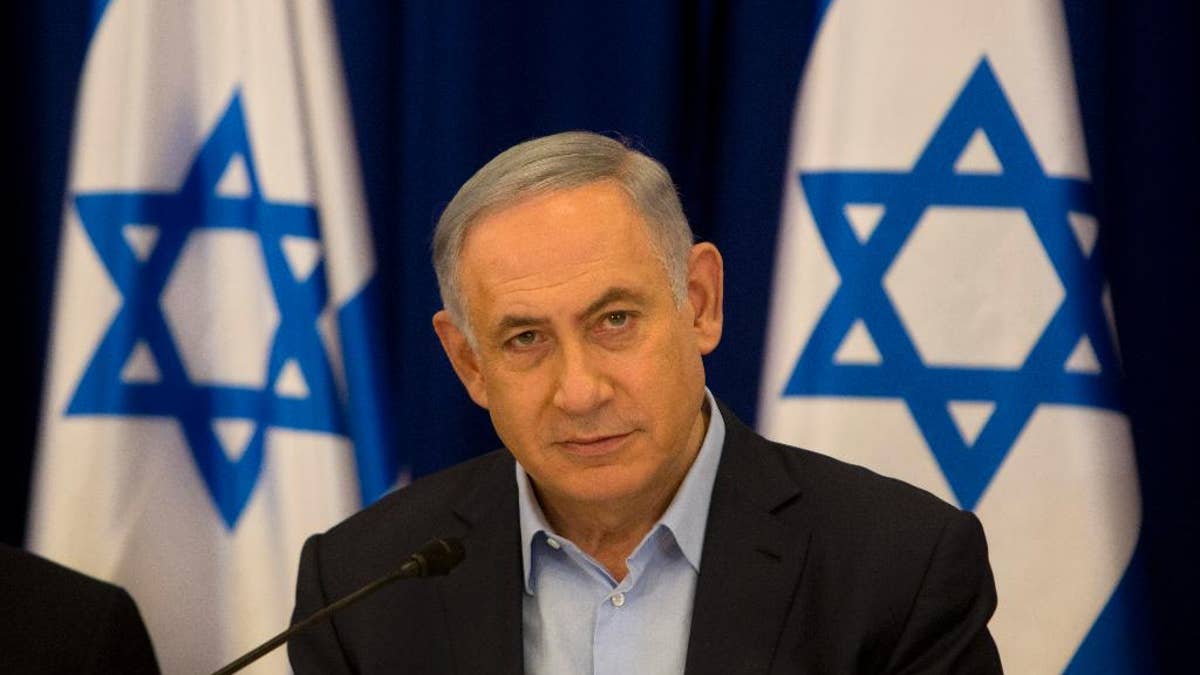
Israeli Prime Minister Benjamin Netanyahu said Sunday his country will never withdraw from the Golan Heights, and the strategic plateau bordering Syria will forever stay in Israeli hands. (AP Photo/Sebastian Scheiner, Pool) (The Associated Press)
Prime Minister Benjamin Netanyahu has made his first public appeal for the United States to officially recognize Israeli sovereignty over the Golan Heights.
“The Golan Heights is tremendously important for our security,” Netanyahu said in Jerusalem, alongside U.S. National Security Adviser John Bolton on Sunday night, adding Israel “will never leave the Golan Heights,” and stressed the gravity of all countries recognizing the region as Israeli territory.
Netanyahu also acknowledged he has previously raised the matter behind closed doors with President Trump, who reportedly supported the idea. But Trump was concerned by a possible rebuke from Russia, the leading international authority and staunch supporter of Syrian President Bashar al-Assad, which mandates Israel is Syrian territory.
Much of the international community regards the Golan Heights as part of Syria, albeit under Israeli occupation, since the neighboring nation took it during the 1967 Six-Day War. Republican Senators Tom Cotton and Ted Cruz have both called for the Trump administration to observe Israel’s sovereignty in the Golan by putting forward bills, which the White House is yet to take a position on.
One Israeli intelligence source told Fox News there is a “good chance” the U.S. will heed the request, as quite simply “they live there, they recognize it as Israeli,” and it’s just a matter of the United States also making that formal recognition. The move would be seen as similar to the controversial decision last year to relocate the American embassy to the “Israeli capital” of Jerusalem.
Netanyahu’s latest push, which comes on the heels of Trump’s announcement that the U.S military will completely withdraw from Syria, has picked up both positive and negative reactions from experts and analysts.
“It seems increasingly likely the United States is prepared to officially recognize the Golan Heights as part of Israel. Acknowledging Israeli sovereignty over the strategically-critical heights would obviously be in Israel’s interest, but also in the interest of the United States,” explained Jonathan Ruhe, Associate Director, JINSA’s Gemunder Center for Defense and Strategy. “It would underscore U.S. support for Israel’s self-defense, in particular against Iran and its proxies in neighboring Syria – an issue that’s increasingly important as the United States reduces its own presence in that country and relies increasingly on its Middle East allies to push back against Tehran.”
SYRIA CEASEFIRE BROKERED BY US, RUSSIA HOLDING, BUT WITH FLAWS, 'TRICKS' IN PLAY
KEANU REEVES' PICTURE AMONG TOOLS IN CHINA'S CRACKDOWN ON UIGHUR MINORITY
Yet Ruhe emphasized “potential blowback in the form of negative reactions from the rest of the Middle East – including from Israel’s Arab partners” would not be out of the question.
“But as we saw with the embassy move to Jerusalem, this wouldn’t necessarily have strategic or enduring negative consequences for the United States or Israel,” Ruhe continued. “Moreover, unlike the issue of Jerusalem, the Golan wouldn’t be part of any future Israel-Palestinian peace agreement, making U.S. recognition of Israeli sovereignty much more straightforward than any issue involving Jerusalem or other territories like the West Bank.”
And according to Raphael Marcus, Visiting Research Fellow at the Department of War Studies at the King's College London the Golan Heights indeed “remains strategically and militarily important for Israel, in light of Iranian and Hezbollah operational activity in southern Syria, specifically on the Syrian side of the Golan.”
“Since at least 2015, both Iranian military operatives and Hezbollah have attempted to set up forward military outposts to threaten and attack Israel from the Syrian side of the Golan,” he cautioned. “Additionally, the murderous Assad regime is obviously not a responsible world player, and it remains a security interest of Israel to keep the Golan Heights which provides a critical vantage point over northern Israel.”
But others view it as Israel using the U.S in an overreaching quest.
"This is another sign of how the Israeli government sees in the Trump administration an unprecedented opportunity to advance goals long rejected by the international community,” said Ben White, journalist, and author of “Cracks in the Wall: Beyond Apartheid in Palestine/Israel.” “Should Netanyahu get his wish, then we might also be another step closer to Israel's formal annexation of some, or all, of the occupied West Bank.”
Michael Koplow, Policy Director, Israel Policy Forum pointed out that while remaining in the Golan is a "security imperative for Israel," perhaps creating a long-scale stand at this time is not necessary.
"The drawback to formal American recognition of Israeli sovereignty on the Golan, however, is that it is an issue that has been entirely non-controversial, unlike Israel’s presence in the West Bank. Israel can easily maintain the status quo on the Golan without any U.S. recognition whatsoever, but American recognition runs the risk of turning what has been a quiet issue into one that all of a sudden becomes controversial once the spotlight is shone on it," he added. "It may end up swapping a security win for a public relations win, which is particularly dangerous now given the heightened importance of keeping the Golan quiet as the Syrian endgame includes a permanent Iranian presence across the Israeli border."








































